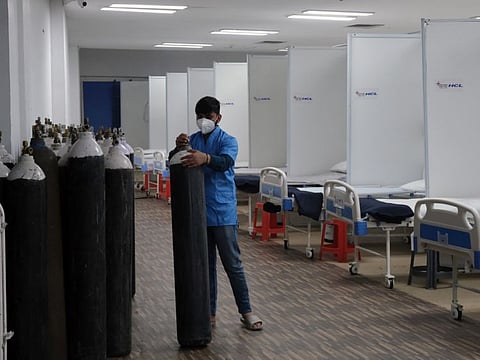India facing 3rd COVID-19 wave, to hit peak in February: Scientists
Though cases are mild, it’s time to be cautious otherwise India will be in trouble: Expert

New Delhi: A slew of studies by Indian scientists show that amid rising cases of Omicron, the third wave of COVID-19 has set in India from mid-December, and it may hit its peak in February next year.
A yet-to-be peer reviewed study led by a team of researchers from the Indian Institutes of Technology (IIT), Kanpur used a statistical methodology based on the fitting of a mixture of Gaussian distributions - based on an algorithm for clustering to estimate the parameters.
The third wave was forecast using the data on the first two waves of pandemic. The team also utilised the data of different countries that are already facing the third wave, modelling their daily cases data and predicting the impact and timeline for the third wave in India.
“The report forecasts India’s third wave of COVID-19 to start around mid-December 2021 and the cases to peak in the beginning of February 2022,” Subhra Sankar Dhar, Associate Professor, Department of Mathematics and Statistics, wrote in the paper.
A separate study led by a joint team from the IITs Hyderabad and Kanpur is based on the Sutra model, which tracks the country’s Covid-19 trajectory.
According to Professor M. Vidyasagar of IIT Hyderabad and Maninda Agrawal o IIT Kanpur, the daily caseload is expected to rise as Omicron begins to displace Delta as the dominant variant.
It’s time to be cautious otherwise India will be in trouble: Expert
With over 200 cases of Omicron variant of COVID-19 in India, the health experts treating the patients infected with the virus say that so far cases are mild and the recovery rate is high but it is high time to be cautious otherwise India will be in trouble.
The country has reported 213 cases of Omicron so far, with two states-- Maharashtra and Delhi-- and topping the number of cases.
While speaking to ANI, Dr Vivek Nangia, Principal Director and Head of Pulmonology, Max Hospital, Saket Complex said, “As of now we have got patients who are asymptomatic or mildly symptomatic and no significant symptoms or complications have developed so far. Patients admitted do not even require oxygen or any other IV medication.”
He said that most omicron patients have recorded travel history either from at-risk countries or other countries. As per the government norms for omicron patients, an institutional quarantine of these patients has to be followed due to its high transmissibility rate.
“All the patients admitted here have been asked to get institutional quarantine by the govt. These are the travellers who were returning from other countries like the UK and were tested positive at the airport and asked for an institutional quarantine. So far they all got very mild to no symptoms at all,” said Dr Nangia.
He further said that the mild symptoms of omicron are fever, body ache, sore throat, cough and cold which is similar to the delta variant that India had which became the dominant strain worldwide.
The health expert also believes that with the festive season coming in, the numbers are going to increase.
“The way things are going we are already seeing a surge in a number of cases. Initially, we saw 20 to 30 cases being reported now we are seeing cases in hundreds. The number of cases will keep increasing, especially due to the upcoming festive season. Moreover, with people moving around, I am sure we are in trouble,” he added.
“It’s high time we all should be cautious and follow all the COVID protocol behaviour otherwise we will be in trouble again similar to the beginning of this year,” said Dr Nangia.
Modi to hold Covid review meeting on Thursday
Amid the growing Omicron cases, Prime Minister Narendra Modi will on Thursday hold a review meeting on the Covid related situation in the country.
Meanwhile, the Centre has said that the new Covid variant Omicron is three times more transmissible than the Delta variant.
The Centre has asked the states to review the emerging data of Covid-19 affected population, geographical spread, hospital infrastructure and its utilisation, manpower, notifying Containment Zones and the enforcement of perimeter of containment zones at the district levels. The Centre has also asked the states to formulate a strategy that can ensure infection is contained at the local level itself before it spreads to other parts.
Sign up for the Daily Briefing
Get the latest news and updates straight to your inbox



